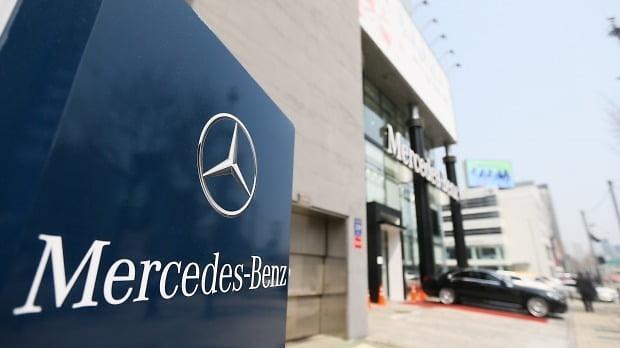[News Focus] Will Mercedes-Benz’s emissions penalty alter car market?
By Kim Da-solPublished : May 7, 2020 - 17:06

After Mercedes-Benz Korea was slapped with the largest-ever fine of 77.6 billion won ($63.4 million) by the Environment Ministry for rigging emissions data on diesel cars, the market paid attention to whether it would alter the imported car market here.
The ministry on Wednesday said some 4,400 diesel cars of 14 models sold by Mercedes-Benz Korea, Nissan Korea and Porsche Korea between 2012 and 2018 passed pollution standards by illicitly manipulating software to reduce the amount of nitrogen oxide exhausted during the qualification test.
Authorities said the certification for the models will be revoked this month while the vehicles will be recalled.
This is the seventh time in Korea to file a criminal complaint against foreign carmakers for rigging emissions data using an illicit program, after Audi Volkswagen was first caught in 2015. It marks the first case where Mercedes-Benz was found to have cheated on the emissions test.
The automaker, in response, has denied using any such illicit programs, and said it will take due legal measures to counter the ministry’s decision.
“Mercedes-Benz deems the Korean market as extremely crucial. We regret having caused concerns to customers,” the automaker said in a statement.
It went on to say that it was difficult to concede to the ministry’s decision as they had “fair technical and legal grounds” to have used the system in question.
Describing the program as part of an integrated emissions control system in which hundreds of functions work in conjunction, the company said it is impossible to individually analyze each function.
Since 2016, Mercedes-Benz has sat atop the imported car market here and had record-high sales last year since its entry into the domestic market in the mid-1980s. In 2019, it sold 78,133 vehicles, up by 10.4 percent from the previous year. It also set a record for selling over 100,000 units of the E-Class priced at at least 70 million won here, three years after its launch.
“It is not an exaggeration that many Korean customers have related the luxury, sophisticated image of Mercedes-Benz Korea to its quality products.
But following the government’s latest announcement, customers may shift their interest to other imported car brands that can substitute for Mercedes-Benz,” an industry insider told The Korea Herald.
Others also compared the latest emissions-rigging scandal to Audi VW’s “Dieselgate,” which rocked the industry in 2015.
In 2015, Audi VW was found to have used software to cheat on diesel emissions tests on some 11 million cars of 15 diesel models. Along with the fine, this led to a sales suspension of two years, significantly harming the automaker’s sales and standing here.
According to Korea Automobile Importers and Distributors Association data, in 2015, Audi VW sold the third most foreign cars with flagship models A4, A6, Tiguan and Golf, accounting for 28 percent of market share. BMW and Mercedes-Benz had held 19.6 percent and 19.3 percent of market share, respectively.
But in 2017, the sales figure halved. Zero VW cars were sold in 2017, while only 962 Audi cars sold here.
Market experts viewed that the latest scandal may influence the industry to face a market contraction.
“It is undeniable that Mercedes-Benz has significantly attributed to expanding the country’s imported car sector in terms of size as well as volume. It is an imported car brand but also one that leads Korea’s car market, which is why it may face more responsibility” said Daelim University automotive engineering professor Kim Pil-soo.
But he went on that in the long term, Mercedes-Benz’s overall sales won’t be shaken, given the characteristic of the Korean consumers.
“Even during the latest outbreak of COVID-19, the sales of imported carmakers like Mercedes-Benz, in fact, inched up. Korean consumers find environmental issues not closely related to which cars they drive,” he said.
“Consumers will still buy Mercedes-Benz cars if they are sold at cheaper prices via promotions, by which Mercedes-Benz can maintain its current brand image. That is why the role of civic groups like consumer associations are important, although such groups still tend to lack professionalism.”
By Kim Da-sol (ddd@heraldcorp.com)








![[KH Explains] How should Korea adjust its trade defenses against Chinese EVs?](http://res.heraldm.com/phpwas/restmb_idxmake.php?idx=644&simg=/content/image/2024/04/15/20240415050562_0.jpg&u=20240415144419)











![[Today’s K-pop] Stray Kids to return soon: report](http://res.heraldm.com/phpwas/restmb_idxmake.php?idx=642&simg=/content/image/2024/04/16/20240416050713_0.jpg&u=)